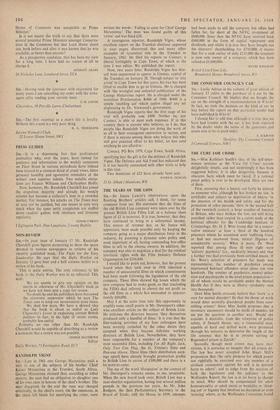SIR,—Sir James Lawrie's observations upon the Boulting Brothers' articles call,
1 think, for some comment from me. His statement that the films of the old British Lion company were taken over by the present British Lion Films Ltd. at a balance sheet figure of £1 is incorrect. It is true, however, that they have continued to bring in a substantial income. This source of revenue has, as Sir James will appreciate, been made possible only by keeping the company going as a major distribution force in the industry, by pursuing a dynamic sales policy and, most important of all, having outstanding box-office films to sell to the cinema owners. In addition, the company was able to negotiate a deal for the residual television rights with the Film Industry Defence Organisation for £316,600.
1 would like to point out, however, that the present board 'when they took over in 1958 inherited a number of unsuccessful films on which commitments had been made following the liquidation of the old company. These films showed big losses which the new company had to make good, so that (excluding the FIDO deal referred to above) the net profit on the old films as a whole has amounted to approxi- mately £60,000.
May I at the same time take this opportunity to amplify some small points in Mr. Davenport's other- wise excellent article on the subject of British Lion. He criticises the directors because 'they themselves produced only a handful of films.' It is true that the film-making activities of my four colleagues have been severely curtailed by the other duties they accepted when they became full-time working directors of British Lion. Nevertheless, they have been responsible for a number of the company's most successful films, including I'm All Right, Jack, Only Two Can Play, the St. Trinian's films and Heavens Above. These films (their distribution earn- ings apart) have already brought production profits to British Lion in excess of £500,000 and there is a lot more to come.
The use of the word 'dissipation' in the context of Mr. Davenport's remarks seems, to me, unsuitable. When the new board took over, British Lion was a near-derelict organisation, having lost several million pounds in the previous ten years. As Mr. John Rodgers, the then Parliamentary Secretary to the Board of Trade, told the House in 1959, attempts had been made to sell the company but offers had fallen far, far short of the NFFC investment of £600,000. Since then the NFFC have received back £660,000 in the form of capital repayment and dividends, and whilst it is true they have bought out the directors' shareholding for £795,000, it means that for a cash outlay of only £135,000 the taxpayer is now sole owner of a company which has been valued at £1,600,000.
DAVID KINGSI.EY
British Lion Films Ltd., Broadwick House, Broadwick Street, W1


































 Previous page
Previous page